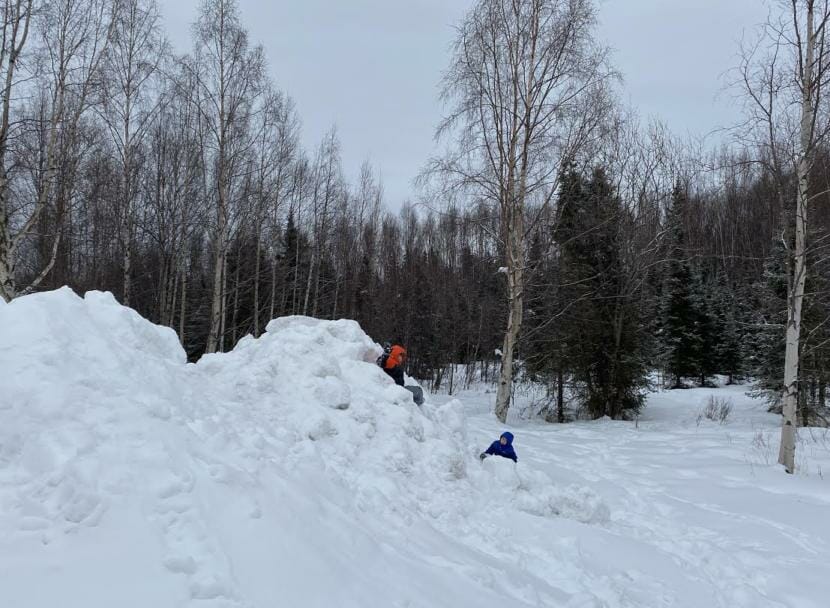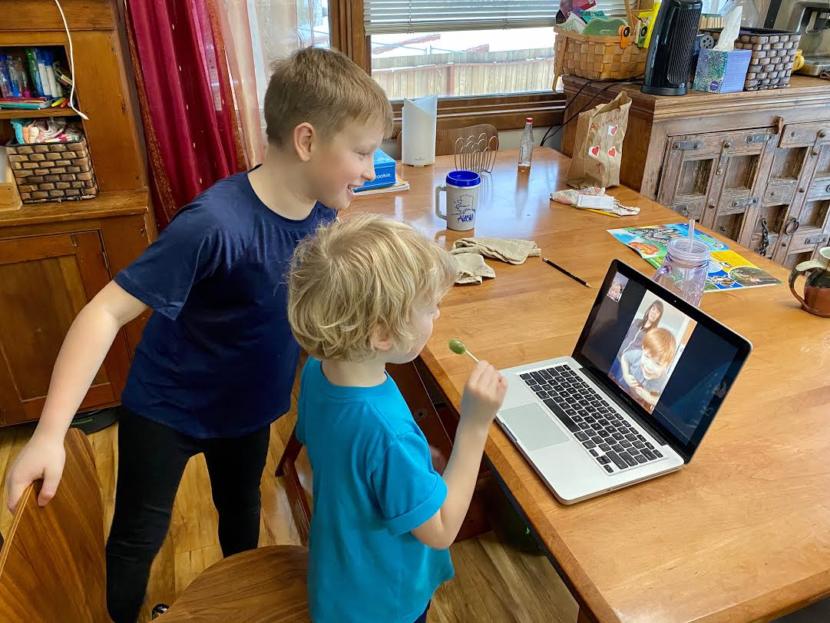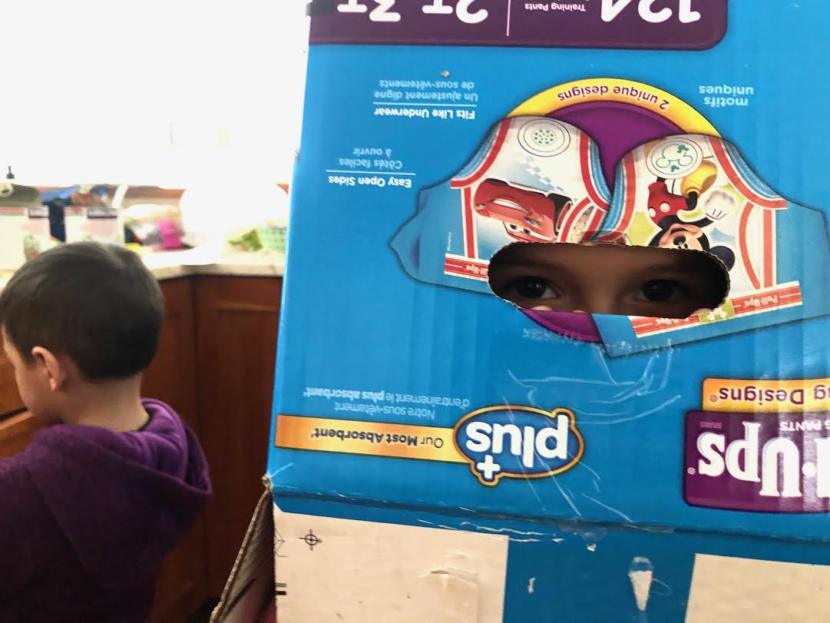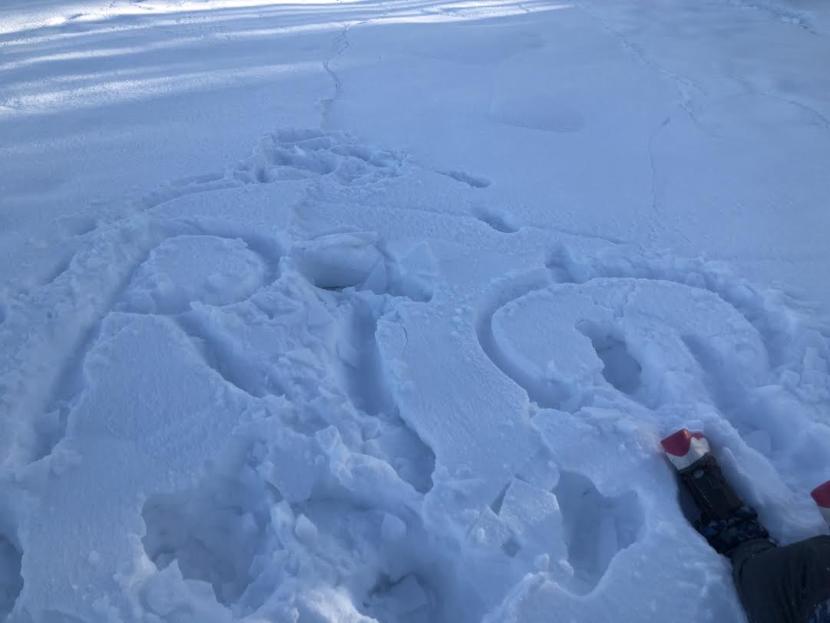
Thousands of Alaska parents are in a tailspin as they scramble to find care for their kids during the global coronavirus pandemic that has closed public schools across the state.
For some, daycares are still an option. But for parents of school-age children, the choices are slim. And that means staying home with kids while working, considering grandparent care, which can be risky for elders, or leaning on older children to care for the younger ones. Other parents say they still don’t know what they’re going to do. In some homes right now, the days are chaos.
“We’re just trying to find creative ways to keep everybody busy. Or keep the kids busy, we’re plenty busy with work.” said Jen Collins in a phone interview while her two children played outside in the snow.

Collins and her husband, Wade, are both working from home this month. They have jobs in the oil industry in environmental permitting. Collins said they’re balancing meetings and conference calls with taking care of their two children: 4-year-old Gus and 8-year-old Woodson.
“It can be a little tough,” she said. “We work in an industry right now where, you know, things aren’t going very well. So we’re trying to do our best to be as efficient as possible because it’s a little scary with oil at such a low price right now.”
Collins’ oldest son, Woodson, is in second grade at Rogers Park Elementary School. Children across the state didn’t go back to school after spring break this month, and won’t be back in classrooms at least through the end of March in an effort to slow the spread of the coronavirus. There are more than 125,000 children enrolled in Alaska’s public schools.
Collins said she and her husband decided to pull their younger son, Gus, out of daycare, which stayed open.
On Tuesday, Alaska’s state health department recommended child care facilities stay open if they can safely do so. The department said it didn’t want elders to care for children because older people are at an increased risk of severe COVID-19 illness. It recommended child care sites take aggressive measures for screening children for respiratory infections and keep groups small.
Collins said her family decided last week to keep themselves as isolated as they could as the number of known coronavirus cases continues to grow.
“We kind of made a decision as a family on Friday that we were going to practice social distancing, and not really go anywhere,” she said. “So we’ve basically, as of Friday, stayed put in the house, and if one of us had to go run an errand or get something that we needed, we did it solo.”
Collins said they’re focused on keeping some semblance of normalcy at home. That means daily schedules, and waking Woodson and Gus up at 7 a.m., like they would get up for school.

“We try to have it so that they have clear expectations of what the day looks like. My older son is very driven by schedules and order and rules,” Collins said. “He asked me to make two copies of the schedule so he could keep one on his nightstand so he could read it first thing in the morning.”
Their schedule includes time for academics and exercise — whether going outside or following karate lessons online. Collins said she’s fielding questions from her kids about the coronavirus too like: “Can our dog Junebug get the virus?”
They’re also using FaceTime to connect Woodson and Gus with their friends for what Collins calls “virtual playdates.”

Some Alaskans can’t work from home, and are facing different challenges.
Ashley Robbins is a single mother in Anchorage who searched online this week for affordable, reliable child care options. She just landed a new job in customer service at a local distribution center. It’s great news, she said. But she needs to find someone to watch her 1-year-old son Carson. And she needs that person right now.
“I did my interview over the phone today and they said, ‘OK, you’ve got X amount of days to find child care or this position will be filled because it needs to be filled soon,’” she said.
Normally, Carson goes to daycare at the Boy’s and Girl’s Club in West Anchorage. But, following the school district’s lead, the agency has shut down its child care centers and clubs for at least the rest of the month. That impacts about 4,000 children in Anchorage and roughly 8,000 statewide between the ages of six weeks old and 18 years old.
With no family close by to ask, Robbins requested help in one of the COVID-19 Facebook groups that are popping up online. Within an hour, she said, she had more than a dozen people offering to help watch Carson. Many of them had recently gotten laid off after the city mayor shut down dine-service at restaurants and bars, and later the governor issued a similar order for all of Alaska.
“My phone’s been going off, even still I’m getting messages,” she said about two hours after posting her request online. “There’s a lot of people that are also out of work because they’re in the food industry. So they’re now looking for something to kind of help with their income.”
Robbins said the response has given her a strong sense of community. She’s now going through background checks and interviews.
Across the city, parents like Robbins are trying to figure out how to balance at least two weeks — and possibly more — with their children out of classrooms. Some, like Collins, say they’re trying to stick to a schedule and homeschool their kids. Some are simply trying to figure out how to keep their children safe and also keep their jobs.
Another Anchorage mom, Laura Norton-Cruz, is still figuring it out. She has a 3-year-old son, Rio, and a 6-year-old daughter, Ida Luna. She’s keeping Rio home from daycare and Ida Luna’s public elementary school is closed.
“I would usually rely on my parents but I don’t want to expose my parents to my kids, because they’re little vectors for viruses,” she said.

Norton-Cruz was working on her fellowship on Tuesday and will start a new job at the end of the week with the state health department. She’ll mostly be working on Alaska’s response to coronavirus.
She said she hopes her ex-husband, a freelancer, and his girlfriend — who has a job at a restaurant but is out of work with the closures — will mostly watch Ida Luna and Rio. They’re working on coordinating their schedules.
While she was still home earlier this week, Norton-Cruz said Ida Luna wrote a to-do list for them each day and practiced her Spanish on an online app. She’s enrolled in a dual-language program at the Anchorage School District. Together, they’re also making crafts and taking long morning walks.
There’s still a lot of emotions to process, Norton-Cruz said. Her son Rio said he’s sad he’s not with his daycare friends. And Norton-Cruz, like many, is adjusting to the new coronavirus reality.
“It is so strange. I feel sometimes really calm and present and accepting of where we’re at,” she said. “And I also wake up in the middle of the night with a startling realization that everything is going to be different now.”
Are you a parent in Alaska wrestling with child care in the rapidly evolving coronavirus situation? Reporter Tegan Hanlon wants to hear from you. What are you doing that works? What problems are you trying to solve? What are you learning? And what questions do you still have? Reach Tegan at thanlon@alaskapublic.org or 907-550-8447.

